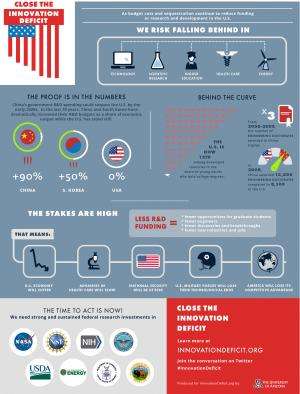Closing the US innovation deficit

The federal government needs to increase its funding for research and development in order for the U.S. to keep its competitive edge in technology, science, health care and defense, officials told a Senate committee on Tuesday, echoing a call to action made by the University of Arizona and other institutions.
During testimony before the Senate Appropriations Committee, lawmakers were urged to address the "innovation deficit," the term used to describe the widening gap between needed and actual investments in research and education.
Those testifying included John Holdren, director of the White House Office of Science and Technology Policy; U.S. Secretary of Energy Ernest Moniz; National Institutes of Health Director Francis Collins; National Science Foundation Director France Córdova; and Arati Prabhakar, director of the U.S. Defense Advanced Research Projects Agency.
They stressed how critical it is for universities and other research institutes to receive the funding they need in order to conceptualize and create the technology required to keep the nation safe, healthy and economically strong.
That same message has been emphasized by UA President Ann Weaver Hart and other university leaders who have been part of the national conversation around the innovation deficit.
"The University of Arizona plays a critical role in worldwide advances – especially those in health care, science and technology," Hart said Wednesday. "To continue these achievements, we need adequate funding and support. We must educate our lawmakers on the growing innovation gap."
Hart was one of more than 100 higher education leaders who signed an open letter to President Barack Obama and Congress that called efforts to close the innovation deficit a national imperative. She and the other signatories noted that investments in research and education lead to the types of innovation and new technologies that power the nation's economy, create jobs and reduce the budget deficit while ensuring the United States maintains its role as a global leader.
To underscore the widening gap, the UA recently partnered with the Association of American Universities and the Association of Public Land-Grand Universities to create an infographic illustrating the ways in which the U.S. has fallen behind other countries when it comes to supporting research and development.
The effort was coordinated by Close the Innovation Deficit, a coalition of leaders in business, higher education and scientific and high-tech manufacturing who share concerns about dwindling federal investment in research and higher education. The coalition noted the UA-created info graphic in a news release issued before Tuesday's hearing.
The infographic shows that while research and development spending in the U.S. continues to decline, other countries have dramatically increased theirs. Over the past 10 years, South Korea has increased its research and development spending by nearly 50 percent and China by nearly 90 percent. The infographic also notes that in 2008, China awarded 15,000 engineering doctorates while the U.S. awarded 8,100.
Hart said she and other leaders in higher education are prepared to keep the issue at the forefront and continue urging the president and Congress to close the innovation deficit and give research and development the support it needs.
"Our nation is built on a commitment to improve the future for the generations that come after us. And as a land-grant university, the UA has a mission that includes making discoveries that can change the world – and then bringing those discoveries to the world," she said. "We can't do this without strong and sustained investment in research and education."
Provided by University of Arizona
















